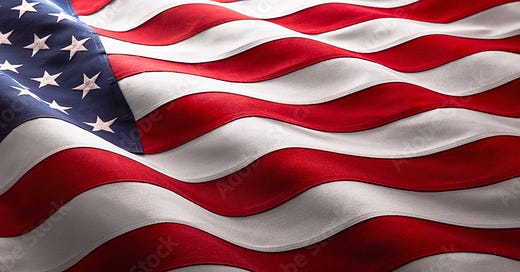On the 249th Birthday of an Imperfect, Extraordinary Dream
Somewhere around the early 1700s, something unusual started to occur in the human story.
For most of recorded history—tens of thousands of years—life for the average person was brutally short, bone-achingly hard, and almost entirely defined by the accidents of birth. A person’s role in the world was fixed. They farmed, they fought, they served, they died. Subsistence living wasn’t the exception; it was the rule.
There’s a chart I think about often. If you’ve ever seen it, you’ll know what I mean. It looks like a hockey stick. For millennia, human progress—measured by life expectancy, income, health, and opportunity—was essentially flat. People were born into poverty, worked themselves into early graves, and left little behind. And then, a few hundred years ago, the line curves sharply upward.
It doesn’t look like much at first. A subtle bend, barely perceptible. But then it steepens. It shoots north. The quality of life for billions of people, measured in everything from literacy to leisure to life expectancy, improves in a way that is historically unprecedented.
The question I find myself asking, especially today on the Fourth of July, is: What changed?
The answer, I think, is this:
A set of dangerous ideas took root.
Ideas that said human beings weren’t just tools for kings or fodder for war. That individual dignity mattered. Those rights weren’t granted by a ruler; they were inherent. That liberty was worth protecting not because it was efficient, but because it was right.
These were radical thoughts at the time. And they became the spark for something that, once lit, has never fully gone out: the notion that ordinary people could shape their own futures. Innovation, imagination, and freedom of thought can unlock progress not just for a few but for many.
And the results? Well, here we are.
We live in a world where the cost of lighting your home has dropped by 99% since the 1800s. Where fewer children die of preventable diseases. Where more people can read, vote, create, and choose. A world where the default for more and more of us is not survival, but possibility.
Of course, the story isn’t all clean lines and upward motion. It never is.
Fear, as it always has, remains one of the most potent tools for control. Fear keeps people small. It tells us that the world is ending, that enemies are everywhere, and that there is not enough to go around.
Fear is ancient. It’s efficient. And it works.
But hope, that stubborn, unreasonable, sometimes quiet thing, has always been the real driver of human progress.
Hope is what fueled the first abolitionists. Hope is what brought waves of immigrants to these shores. Hope is what sent rockets to the moon, cured diseases, and made a handful of philosophers and farmers believe that an experiment in self-government was worth the risk.
And so, sitting here today on America’s 249th birthday, I’m choosing—deliberately, sometimes against my own cynicism—to put my chips on hope.
Not in a naive, flag-waving, nothing-to-see-here way. I’m not blind to our flaws. I’m not blind to the fact that “liberty and justice for all” has never fully delivered on its promise.
But I’m not blind either to how far we’ve come. And how the very nature of America is that it is always unfinished. Always in the business of becoming.
That’s the work I want to keep doing. For myself. For my kids. For the people who still stand outside the gates of the so-called American Dream and wonder if it will ever open for them.
Because I still believe, maybe more than ever, that this remains the most powerful promise in the history of the world: that every person matters. That every life has dignity. That every dream deserves a chance.
That idea, the hockey stick curve of human dignity, of human possibility, is still bending upward.
And so I say, with gratitude and without irony:
Happy Birthday, America.





